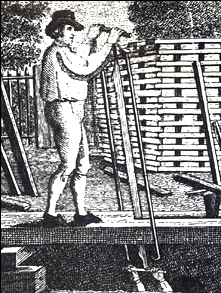Top dog
Q From James Meredith: A display at a museum I was at recently featured pit-sawing. It said that the man who stood on the top of the log hauling on one end of the saw was called the top dog and the one in the pit below pulling the other end was the bottom dog. This was claimed to be where the expressions come from. Is this right?
A The story’s quite common and you will find it in other museum displays and also online. As it happens, I came across it during my recent holiday in an exhibition at the former convict settlement of Port Arthur in Tasmania. The idea behind it is that the top dog was the senior of the team, who controlled the cutting, but that the bottom dog contributed nothing more than muscle power and had the worst of it, not least because he got covered in sawdust.

Pitsawing, from The Book of Trades, 1807
The Oxford English Dictionary records both terms (and notes that bottom dog is equivalent to the more common underdog and that the same idea as top dog appears in overdog). It has examples of top dog from 1900 and of bottom dog from 1884. I’ve been able to find earlier examples in newspaper archives, the oldest from 1859.
I can’t prove the stories untrue, but I’m extremely suspicious of them. That’s because all the early examples I’ve been able to trace refer to literal dog fights, in which the dog on top is clearly getting the better of the dispute and is able to impose himself on the one underneath. I can’t find a single historical example that refers to the sawing of wood.
As always, it’s hard to prove a negative. But I remain sceptical. It wouldn’t be too surprising to find that top dog, bottom dog and related terms later became attached to the upper and lower sawyers through the obvious association of ideas (though, as I say, I can’t find any evidence for this at all). But the earliest examples show that the origin does lie in literal dog fights.
If anyone can find a usage of top dog before 1859 that relates to sawing wood, and hence before the first known example that refers to a dog fight, I shall accept the tellers of the tale are right. But not otherwise!
